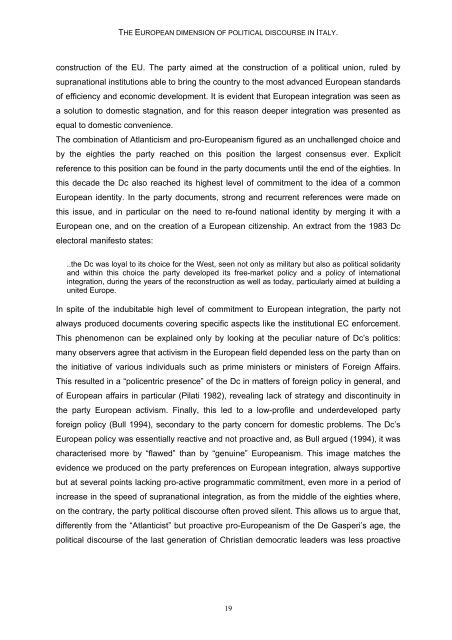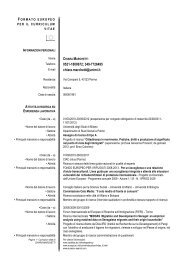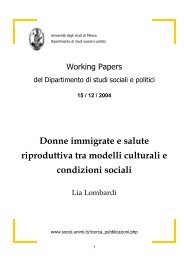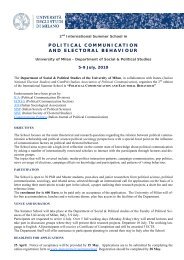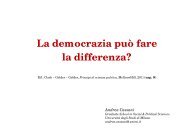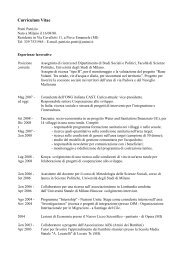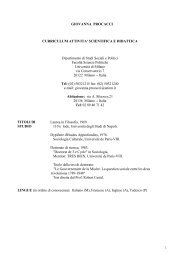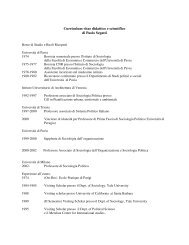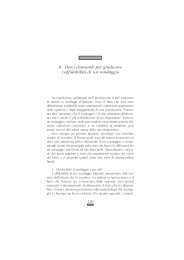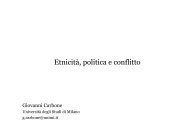The european dimension of political discourse in Italy. A ... - CIRCaP
The european dimension of political discourse in Italy. A ... - CIRCaP
The european dimension of political discourse in Italy. A ... - CIRCaP
You also want an ePaper? Increase the reach of your titles
YUMPU automatically turns print PDFs into web optimized ePapers that Google loves.
THE EUROPEAN DIMENSION OF POLITICAL DISCOURSE IN ITALY.<br />
construction <strong>of</strong> the EU. <strong>The</strong> party aimed at the construction <strong>of</strong> a <strong>political</strong> union, ruled by<br />
supranational <strong>in</strong>stitutions able to br<strong>in</strong>g the country to the most advanced European standards<br />
<strong>of</strong> efficiency and economic development. It is evident that European <strong>in</strong>tegration was seen as<br />
a solution to domestic stagnation, and for this reason deeper <strong>in</strong>tegration was presented as<br />
equal to domestic convenience.<br />
<strong>The</strong> comb<strong>in</strong>ation <strong>of</strong> Atlanticism and pro-Europeanism figured as an unchallenged choice and<br />
by the eighties the party reached on this position the largest consensus ever. Explicit<br />
reference to this position can be found <strong>in</strong> the party documents until the end <strong>of</strong> the eighties. In<br />
this decade the Dc also reached its highest level <strong>of</strong> commitment to the idea <strong>of</strong> a common<br />
European identity. In the party documents, strong and recurrent references were made on<br />
this issue, and <strong>in</strong> particular on the need to re-found national identity by merg<strong>in</strong>g it with a<br />
European one, and on the creation <strong>of</strong> a European citizenship. An extract from the 1983 Dc<br />
electoral manifesto states:<br />
..the Dc was loyal to its choice for the West, seen not only as military but also as <strong>political</strong> solidarity<br />
and with<strong>in</strong> this choice the party developed its free-market policy and a policy <strong>of</strong> <strong>in</strong>ternational<br />
<strong>in</strong>tegration, dur<strong>in</strong>g the years <strong>of</strong> the reconstruction as well as today, particularly aimed at build<strong>in</strong>g a<br />
united Europe.<br />
In spite <strong>of</strong> the <strong>in</strong>dubitable high level <strong>of</strong> commitment to European <strong>in</strong>tegration, the party not<br />
always produced documents cover<strong>in</strong>g specific aspects like the <strong>in</strong>stitutional EC enforcement.<br />
This phenomenon can be expla<strong>in</strong>ed only by look<strong>in</strong>g at the peculiar nature <strong>of</strong> Dc’s politics:<br />
many observers agree that activism <strong>in</strong> the European field depended less on the party than on<br />
the <strong>in</strong>itiative <strong>of</strong> various <strong>in</strong>dividuals such as prime m<strong>in</strong>isters or m<strong>in</strong>isters <strong>of</strong> Foreign Affairs.<br />
This resulted <strong>in</strong> a “policentric presence” <strong>of</strong> the Dc <strong>in</strong> matters <strong>of</strong> foreign policy <strong>in</strong> general, and<br />
<strong>of</strong> European affairs <strong>in</strong> particular (Pilati 1982), reveal<strong>in</strong>g lack <strong>of</strong> strategy and discont<strong>in</strong>uity <strong>in</strong><br />
the party European activism. F<strong>in</strong>ally, this led to a low-pr<strong>of</strong>ile and underdeveloped party<br />
foreign policy (Bull 1994), secondary to the party concern for domestic problems. <strong>The</strong> Dc’s<br />
European policy was essentially reactive and not proactive and, as Bull argued (1994), it was<br />
characterised more by “flawed” than by “genu<strong>in</strong>e” Europeanism. This image matches the<br />
evidence we produced on the party preferences on European <strong>in</strong>tegration, always supportive<br />
but at several po<strong>in</strong>ts lack<strong>in</strong>g pro-active programmatic commitment, even more <strong>in</strong> a period <strong>of</strong><br />
<strong>in</strong>crease <strong>in</strong> the speed <strong>of</strong> supranational <strong>in</strong>tegration, as from the middle <strong>of</strong> the eighties where,<br />
on the contrary, the party <strong>political</strong> <strong>discourse</strong> <strong>of</strong>ten proved silent. This allows us to argue that,<br />
differently from the “Atlanticist” but proactive pro-Europeanism <strong>of</strong> the De Gasperi’s age, the<br />
<strong>political</strong> <strong>discourse</strong> <strong>of</strong> the last generation <strong>of</strong> Christian democratic leaders was less proactive<br />
19


